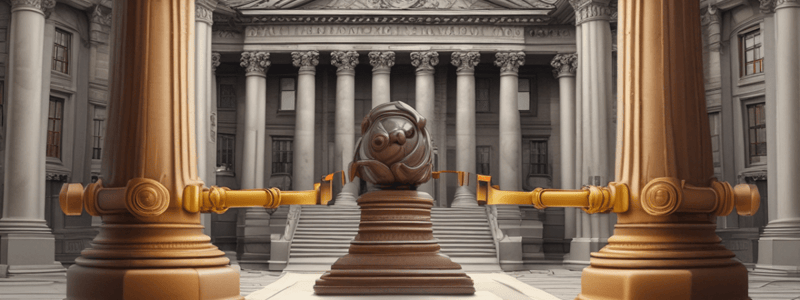Podcast
Questions and Answers
Which of the following is NOT an essential element of defamation?
Which of the following is NOT an essential element of defamation?
- Intent to cause harm
- The statement was made in a public forum (correct)
- Falsity of the statement
- Substantial harm caused to the individual's reputation
Which of the following defenses could be used in a case of alleged defamation involving a public figure?
Which of the following defenses could be used in a case of alleged defamation involving a public figure?
- Proof of malice (correct)
- Lack of intent to cause harm
- The statement was made in a private setting
- Truth of the statement
If a person makes a false statement about another individual, but the statement does not cause any substantial harm to the individual's reputation, can it be considered defamation?
If a person makes a false statement about another individual, but the statement does not cause any substantial harm to the individual's reputation, can it be considered defamation?
- It depends on whether the individual making the statement had malicious intent
- No, harm to the individual's reputation is a necessary element of defamation (correct)
- Yes, as long as the statement was false
- It depends on whether the statement was made in a public or private setting
Which of the following statements is TRUE regarding the defense of privilege in defamation cases?
Which of the following statements is TRUE regarding the defense of privilege in defamation cases?
In a case of alleged slander (oral defamation), how many additional people need to have heard the defamatory statement for it to be considered defamation?
In a case of alleged slander (oral defamation), how many additional people need to have heard the defamatory statement for it to be considered defamation?
If a person makes a true statement about another individual, but the statement causes substantial harm to the individual's reputation, can it be considered defamation?
If a person makes a true statement about another individual, but the statement causes substantial harm to the individual's reputation, can it be considered defamation?
Flashcards are hidden until you start studying
Study Notes
Defamation
Defamation is a legal term used to describe false spoken or written statements that harm someone's reputation. It can take two forms: libel, which involves written defamatory material, and slander, which involves oral defamation. The primary focus of defamation law is to protect individuals from having their reputations unfairly damaged by others through erroneous claims or assertions.
Elements of Defamation
The following elements must be present for defamation to occur:
- Falsity: A statement must be proven untrue to constitute defamation. If something was said with truth or privileged speech, it cannot be considered defamatory.
- Harm: The statement must cause substantial damage to one's reputation, causing injury to the individual's character, feelings, or economic prospects.
- Intent: To establish liability for defamation, proof of malice is required if public figures are involved or the statement is against a private individual.
- Exposure: For libel, the false statement must reach one person outside the immediate circle of family and friends. For slander, it needs to be heard by one additional person, since oral statements generally do not last very long.
Defenses Against Defamation
There are several legal defenses that individuals may use in cases of alleged defamation:
- Truth: If statements were true, they cannot constitute defamation.
- Privilege: Certain privileges protect people from consequences of otherwise defamatory conduct. These include absolute privilege for communications made during official proceedings and qualified privilege for expressions of opinion and reports of matters within the speaker's own scope of information.
- Innocent Dissemination: If someone unknowingly disseminated defamatory material, they may avoid liability under this defense.
Defamation law is a complex area of law that aims to balance the protection of reputation with freedom of speech. It helps ensure that individuals are not unfairly harmed by false claims while allowing people to exercise their right to speak truthfully without facing unnecessary legal repercussions.
Studying That Suits You
Use AI to generate personalized quizzes and flashcards to suit your learning preferences.




